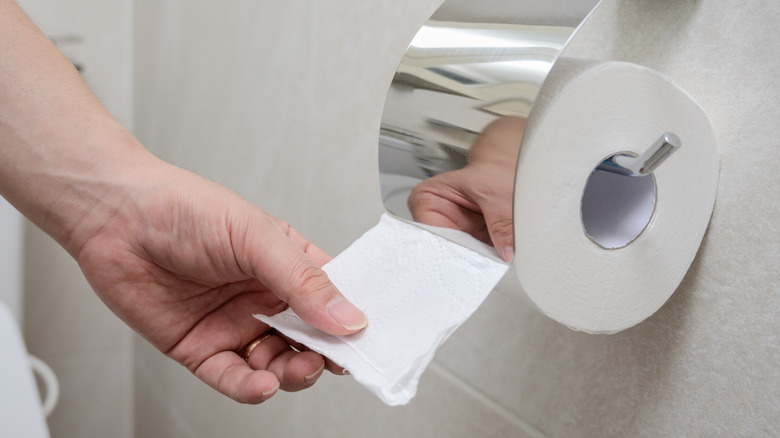Signs Your Painful Urination Is Actually Cancer
With your bladder nearly bursting at the seams, you race to the bathroom to finally relieve yourself after holding in your pee. As you go number one, relief is the last thing you feel as you're hit with a wave of pain and discomfort. Painful urination can be tied to any number of things, which can make narrowing down the cause difficult. Depending on what sensations you feel while peeing, it might give you insight into whether your pain may potentially be related to bladder cancer.
Compared to prostate cancer or colon cancer, we hear relatively little about bladder cancer. Although there are different kinds of bladder cancer depending on where the cancerous growth develops, most cases begin in the cells of the bladder walls, explains the Mayo Clinic. Some individuals may be more vulnerable to bladder cancer than others. This includes people who smoke, those with a personal medical history or family history of bladder cancer, adults over the age of 55, or people who experience recurrent urinary infections. Hematuria, back pain, frequent urination, and painful urination are all potential signs of bladder cancer. Here's what you want to pay attention to if you've begun feeling pain when you pee.
What is dysuria?
In some cases, painful urination that feels like a burning sensation can be a symptom of bladder cancer, according to the National Cancer Institute. Updated 2023 research published in StatPearls defines this burning sensation as dysuria, which also includes pain, itching, or stinging experienced within the urethra while peeing. Most people can expect to be affected by dysuria at one point or another, as it is often seen in connection with common health conditions like urinary tract infections (UTIs). Other infection-related causes of dysuria may include prostatitis, vaginitis, or sexually transmitted infections (STIs). But dysuria can also have causes unrelated to infection.
Certain skin conditions, blockages in the urinary tract, or tumors can also prompt painful urination. Causes of dysuria are generally labeled either inflammatory or noninflammatory, and bladder cancer falls under the umbrella of noninflammatory causes, along with penile cancer, vaginal cancer, renal cell cancer, and more.
Bladder cancer prevention
Cases of ongoing dysuria related to bladder cancer often do not respond to traditional treatment methods, and long-term outcomes will depend on how far the cancer has progressed (via StatPearls). Painful urination, frequent nighttime trips to the bathroom, and the urge to urinate even when one's bladder is empty are considered more common bladder cancer symptoms (via the National Cancer Institute). With more severe disease progression, however, a person may experience bone pain, weight loss, abdominal pain, swelling in the feet, or difficulty urinating, amongst other symptoms.
While a burning sensation when peeing is not always indicative of cancer, call your doctor, who can help determine a diagnosis. Even if it ends up being a relatively common condition like a UTI, you don't want to leave it untreated. According to a 2016 systematic review published in the European Journal of Epidemiology, bladder cancer has a high recurrence rate, but practicing healthy lifestyle habits like not smoking, keeping processed meat consumption to a minimum, and eating plenty of citrus fruits and cruciferous vegetables can help lower the risk of its development in the first place.



